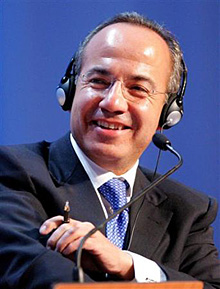 |
 |
 |
 Editorials | Issues | January 2007 Editorials | Issues | January 2007  
Experts Give Calderón High Marks So Far
 Onell R. Soto - San Diego Union-Tribune Onell R. Soto - San Diego Union-Tribune


| | Mexico's President Felipe Calderon-Hinojosa smiles while attending a session 'Latin America Broadens Its Horizons' at the World Economic Forum in Davos, Switzerland, Friday Jan. 26, 2007. (AP/Michael Probst) |
Two months into a six-year term, Mexican President Felipe Calderón is beginning work on some of his country's most vexing problems, including drug violence and the economy, political observers said yesterday.

Calderón ordered federal troops into trouble spots such as Tijuana, extradited several top drug cartel leaders to the United States and pledged to help the poorest in the country, including guaranteeing health care to all of the country's children, they said.

“Calderón has gotten off to a good start,” said George Grayson, a professor of government at the College of William & Mary in Virginia who has written 20 books on Latin American politics.

Grayson spoke to about 50 people at a downtown San Diego panel discussion sponsored by the Center for Immigration Studies, a Washington think tank whose executive director proposed a halt to most immigration, legal and illegal.

The panelists agreed that social and economic instability in Mexico has contributed to massive migration into the United States, although they differed on what the response should be.

Grayson said he expected Calderón's political skills to help him carry many of his proposals through, despite having won the presidency by the slimmest of margins in a three-way race.

He noted that the Mexican president said he would enforce laws without fear of revisiting tragic confrontations between soldiers and protesters, but also has proposed increased spending on social programs.

Grayson said Calderón believes in market forces and will try to break up some of the country's business monopolies, which have kept prices artificially high in several sectors, including communications, electricity and cement.

But he said the new president hasn't tipped his hand regarding immigration to the United States. “Calderón realizes there's no real fix,” he said.

Key to improving conditions in Mexico will be reforms of its legal system, said David Shirk, director of the University of San Diego's Trans-Border Institute.

A stable society needs public order, accountable government officials and access to justice, including the right to speedy and public trials, he said.

While crime declined in Mexico from the 1940s to the 1970s, there has been a perceptible increase over the past 20 years in organized crime and high-level corruption, he said.

Of every 100 crimes in the country, only 25 are reported, fewer than five are investigated and fewer than two are prosecuted, Shirk said.

“The vast majority of crimes go unpunished,” he said.

Calderón's predecessor, Vicente Fox, proposed structural reforms to the criminal justice system, which some states have adopted, but more is needed, Shirk said.

And, he said, what happens in Mexico affects the United States.

“If we want to see a change south of the border, it's important for us to be part of that change,” he said.

Mark Krikorian, the executive director of the group that organized the discussion, instead called for the United States to “insulate ourselves” from a rapidly changing Mexico.

He rejected the idea that cities across the border from each other form integrated economies.

“It, frankly, is a parasitic phenomenon,” he said, calling sprawl along the border “fundamentally in conflict with the interests of the United States.”

He proposed giving the Department of Homeland Security large swaths along the border – a “border security zone” a half-mile to a mile wide – and proposed the government use eminent domain to purchase land and demolish buildings.

He also suggested getting rid of border-crossing cards that allow Mexicans who go through a screening process to enter the United States to go shopping or visit family, as well as taking away green cards from people who live in Mexico and cross the border for work every day.

Grayson, a board member of the Center for Immigration Studies, said he agreed with those suggestions, but said they were unlikely to become reality.

“I don't see any political will to do that,” he said.

Shirk said such a proposal would be “awfully expensive” without any guarantee it would solve any problems.

Instead, he proposed making it easier for people to cross the border legitimately so that efforts to find terrorists or criminals could be better focused.

“If we want to get to that needle, we've got to shrink the haystack,” he said.

Also participating in the discussion was former San Diego U.S. Attorney Peter Nuñez, who is chairman of the board of the Center for Immigration Studies, and S. Lynne Walker, Mexico City correspondent for Copley News Service.

Onell Soto: (619) 293-1280; onell.soto@uniontrib.com | 
 | |
 |



